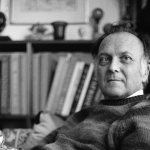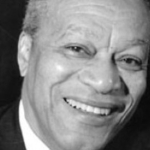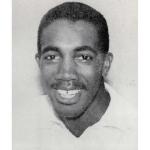In the groves of Africa from their natural wonder
the wildebeest, zebra, the okapi, the elephant,
have enterd the marvelous. No greater marvelous
know I than the mind’s
natural jungle. The wives of the Congo
distil there their red and the husbands
hunt lion with spear and paint Death-spore
on their shields, wear his teeth, claws and hair
on ordinary occasions. There the Swahili
open his doors, let loose thru the trees
the tides of Death’s sound and distil
from their leaves the terrible red. He
is the consort of dreams I have seen, heard
in the orchestral dark
like the barking of dogs.
death is the dog-headed man zebra striped
and surrounded by silence who walks like a lion,
who is black. It was his voice crying come back,
that Virginia Woolf heard, turnd
her fine skull, hounded and haunted, stopt,
pointed into the scent where
I see her in willows, in fog, at the river of sound
in the trees. I see her prepare there
to enter Death’s mountains
like a white Afghan hound pass into the forest,
closed after, let loose in the leaves
with more grace than a hound and more wonder there
even with flowers wound in her hair, allowing herself
like Ophelia a last
And I see
all our tortures absolved in the fog,
dispersed in Death’s forests, forgotten. I see
all this gentleness like a hound in the water
float upward and outward beyond my dark hand.
I am waiting this winter for the more complete black-out,
for the negro armies in the eucalyptus, for the cities
laid open and the cold in the love-light, for hounds
women and birds to go back to their forests and leave us
our solitude.
...
Negroes, negroes, all those princes,
holding cups of rhinoceros bone, make
towers taller than the eucalyptus, turns
within the lips of night and falls,
falls downward, where as giant Kings we gathered
and devourd her burning hands and feet, O Moonbar
thee and Clarinet! those talismans
that quickened in their sheltering leaves like thieves,
those Negroes, all those princes
holding to their mouths like Death
the cups of rhino bone,
were there to burn my hands and feet,
divine the limit of the bone and with their magic
tie and twist me like a rope. I know
no other continent of Africa more dark than this
dark continent of my breast.
And when we are deserted there,
when the rustling electric has passt thru the air,
once more we begin in the blind and blood throat
the African catches; and Desdemona, Desdemona
like a demon wails within our bodies, warns
against this towering Moor of self and then
laments her passing from him.
And I cry, Hear!
Hear in the coild and secretive ear
the drums that I hear beat. The Negroes, all those princes
holding cups of bone and horn, are there in halls
of blood that I call forests, in the dark
and shining caverns where
beats heart and pulses brain, in
jungles of my body, there
Othello moves, striped black and white,
the dog-faced fear. Moves I, I, I,
whom I have seen as black as Orpheus,
pursued deliriously his sound and drownd
in hunger’s tone, the deepest wilderness.
Then it was I, Death singing,
who bewildered the forest. I thot him
my lover like a hound of great purity
disturbing the shadow and flesh of the jungle.
This was the beginning of the ending year.
From all of the empty the tortured appear,
and the bird-faced children crawl out of their fathers
and into that never filld pocket,
the no longer asking but silent, seeing nowhere
the final sleep.
The halls of Africa we seek in dreams
as barriers of dream against the deep, and seas
disturbd turn back upon their tides
into the rooms deserted at the roots of love.
There is no end. And how sad then
is even the Congo. How the tired sirens
come up from the water, not to be toucht
but to lie on the rocks of the thunder.
How sad then is even the marvelous!

















Comment form: